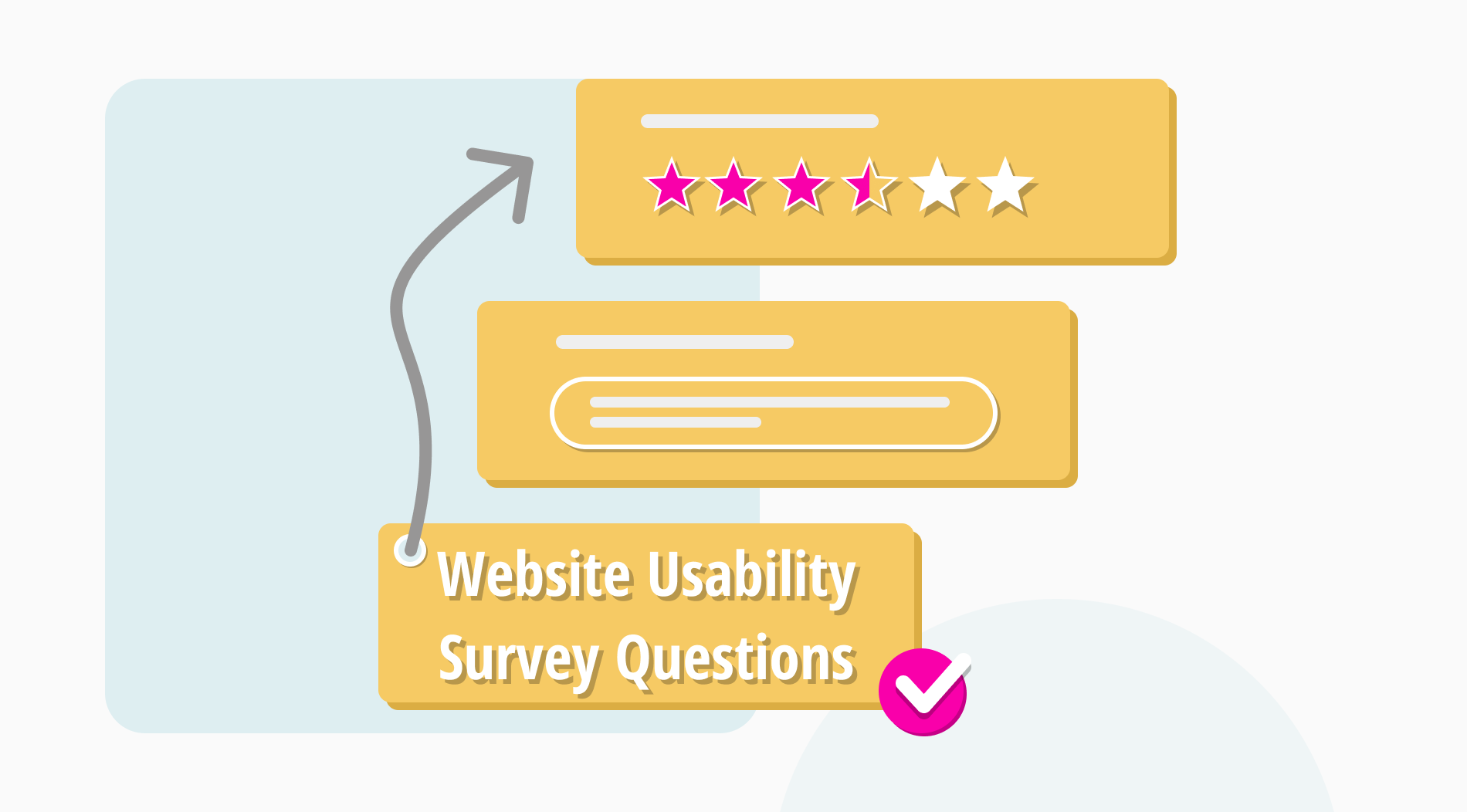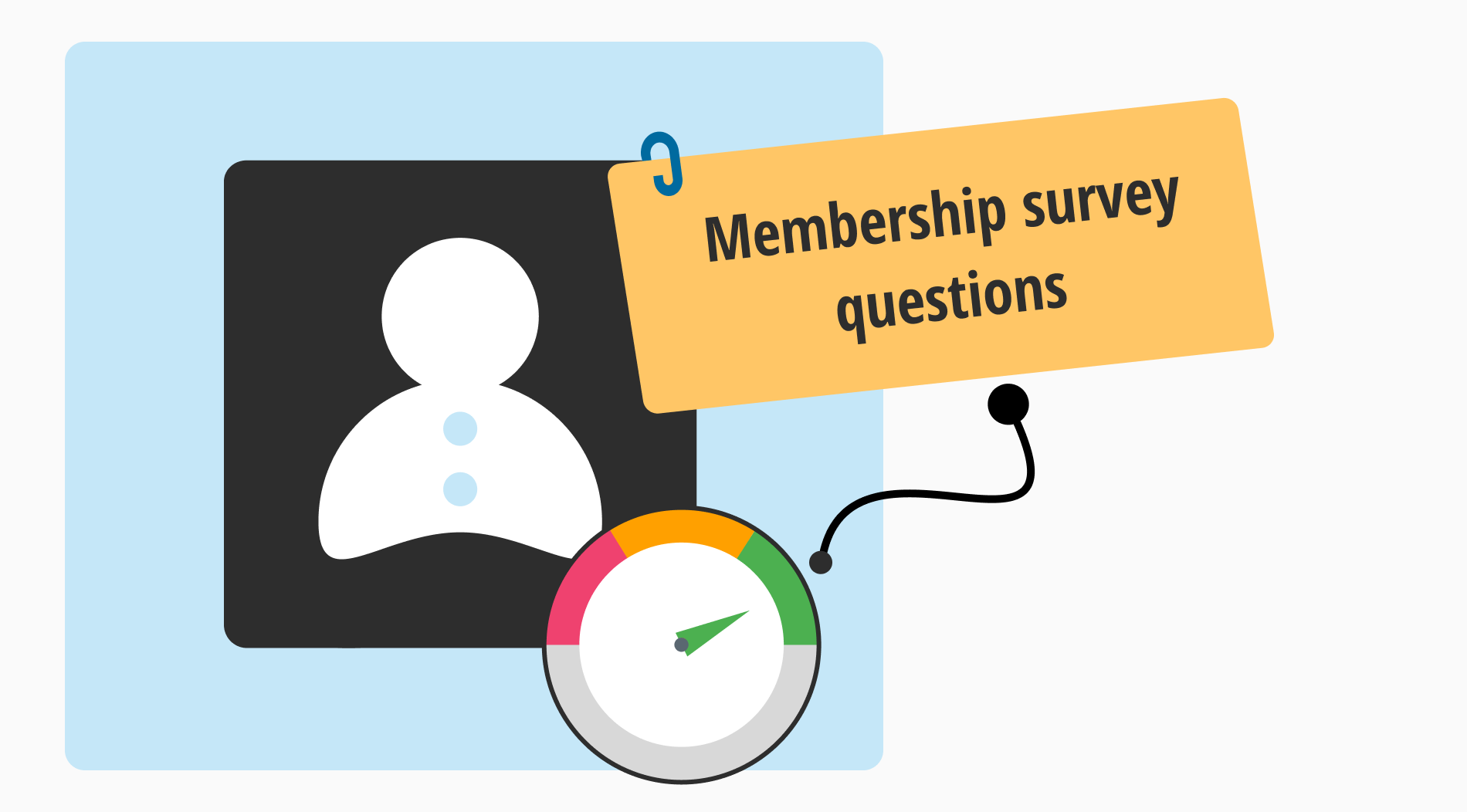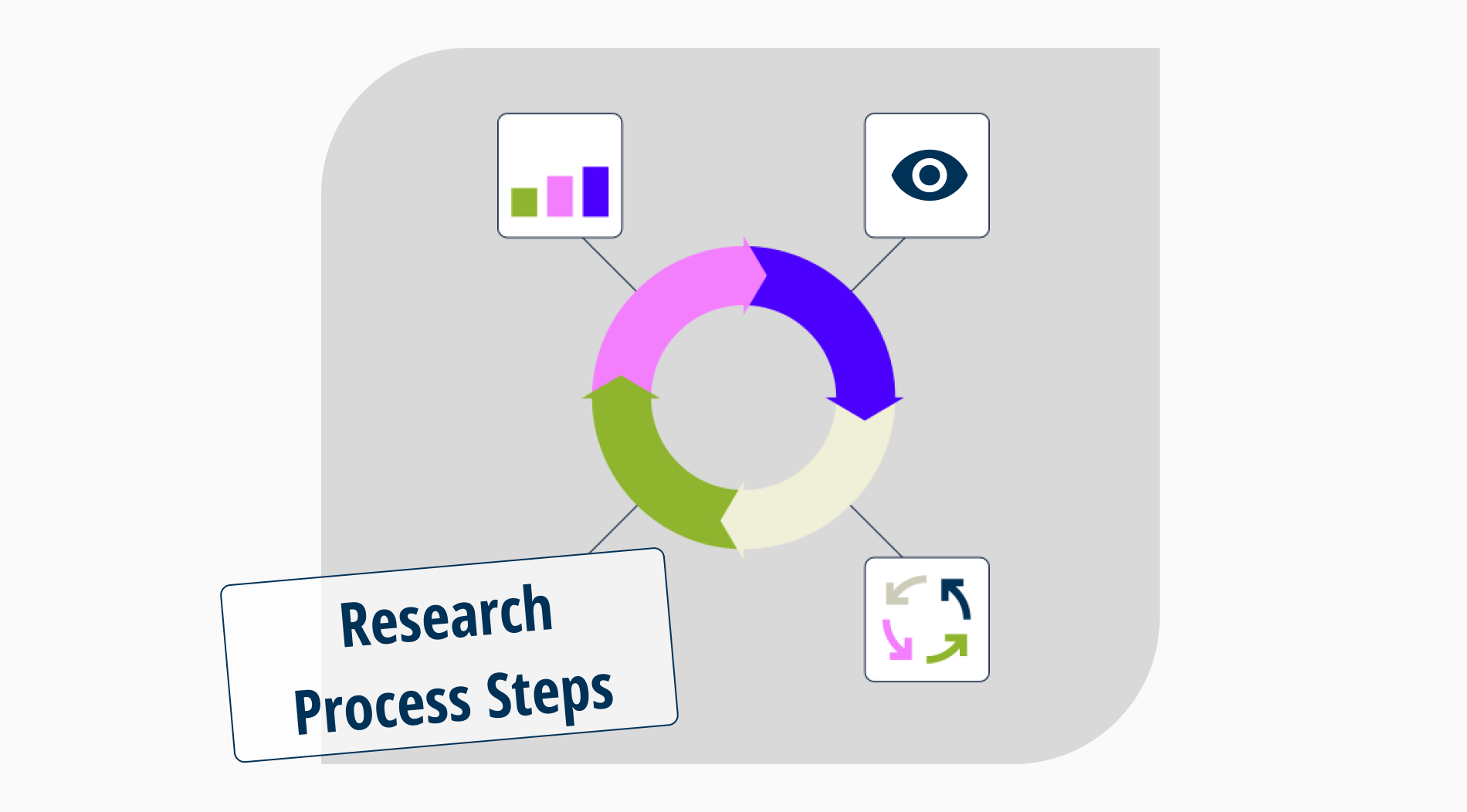
Research is a process that significantly affects the success of your work. This work you have prepared can be an article, a presentation for a product or service, or a scientific study. With thorough and practical research, your project may succeed.
In this article, we talk about the research process and the best practices you can use when carrying out this process. You can learn the steps of a research process. Additionally, we include tips for a better research process for your research project.
What is a research process?

The research process is a set of systematic procedures that enable the researcher to generate knowledge and focus on the topic of interest.
The researcher uses this process to ensure that all program parts are to a high standard. Following the research process allows researchers to collect comprehensive information on the relevant topic and use the information collected effectively.
8 steps of a research process
Although the process may seem complicated and complex, there are basic steps that will make this process easier. Below, we have discussed the steps you should follow in this process in the most straightforward and understandable form. You can track these steps to get your project on target.
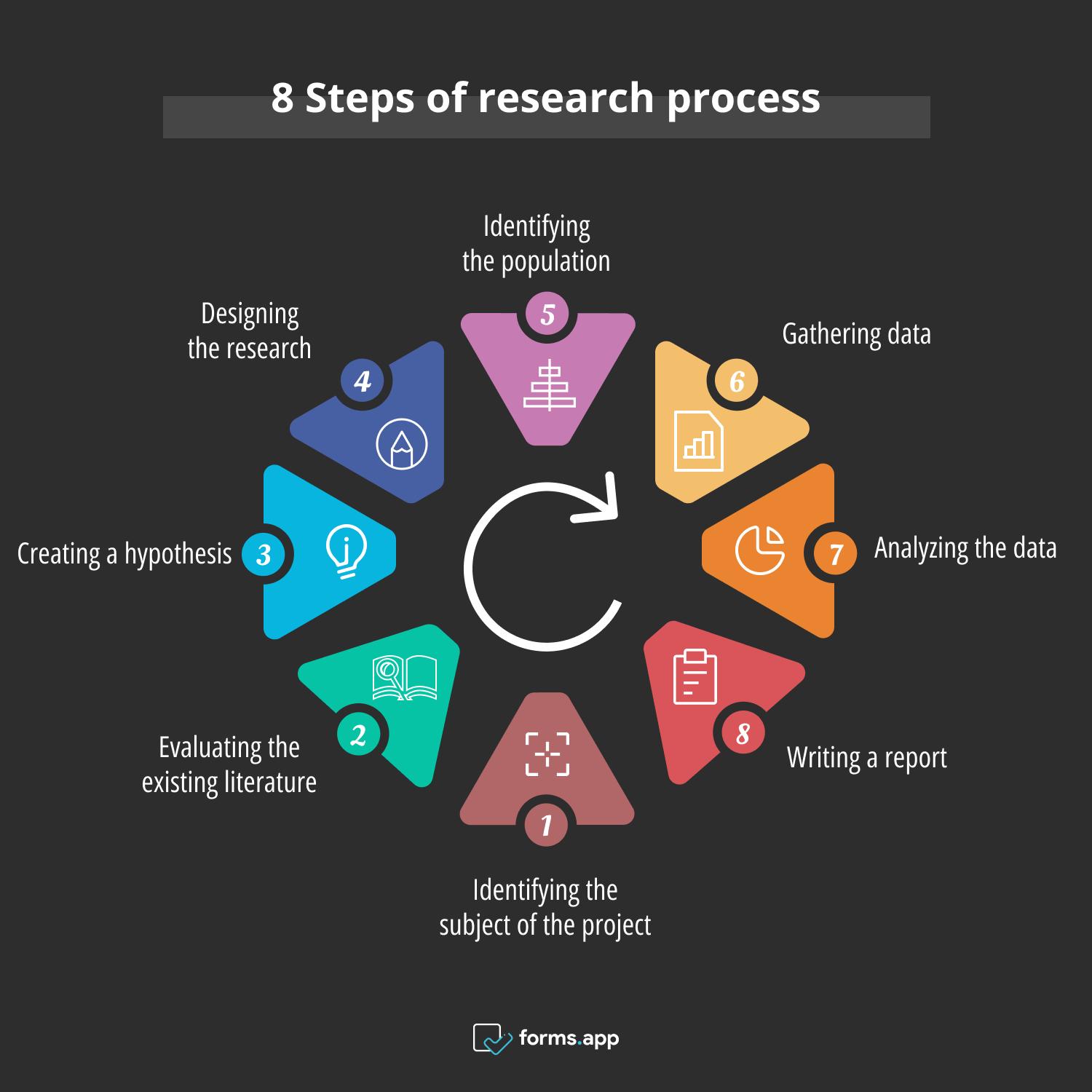
Steps of research process
Step 1: Identifying the subject of the project
Determining a precise research problem is the first step to making your research process effective. The more accurately you decide on the subject, the more effectively you can manage the process. The subject of your project can guide you when determining your research objectives and choosing the research tools and data collection methods you will use.

💡When determining a topic, you can benefit from preliminary research, case studies, interviews with a small focus group, and observational surveys.
Step 2: Evaluating the existing literature
Now that you have defined the topic, it is time to learn more about it. You can evaluate the literature by reviewing the available information. You should learn about previous research and how to conduct these studies. This way, it will be easier for you to understand the results you get. Make your research process more efficient by doing your literature review.
Step 3: Creating a hypothesis
You can create a guide for your studies by developing hypotheses regarding your research. These theories characterize what you hope to achieve throughout your research process. Additionally, these theories help you figure out logical relationships between variables. You can start creating your hypotheses based on the information you have obtained from your preliminary research.
Step 4: Designing the research
Your research design is a critical step in the research planning process. It is a guiding step so that you can test your hypotheses, answer your research questions, and achieve your goal. It also allows you to determine the data sources and experiments you will use to reach an accurate conclusion. It also helps you identify and make business decisions.
Additionally, research design involves planning to minimize the time, money, and effort required for your research. This planning process includes exploration and research, experimentation, data collection methods, and observation.
Step 5: Identifying the population
Regarding the research process, population refers to the group participating in the study. Your project may focus on many things, such as a specific group of people, programs, marketing efforts, or employee evaluations. The subject and purpose of your research help you determine the group you will focus on within the scope of your research.
The working group you have determined is your target audience. Defining the population, that is, the study group, narrows the scope of your study from a broad population to a narrower one. Narrowing the population also allows you to use time and resources more efficiently.
Step 6: Gathering data
Once you identify the population, you can start to collect data on the subject. You can organize the data you gather and make it easier to execute. Data is critical in providing the information needed to answer the research question. When conducting research, consider the sources you need for your research question.
You can utilize a combination of primary sources and secondary sources.
- experiment
- survey
- case study
- focus group
- interviews
- Literature review
- Systematic review
- Meta-analysis
- Official and unofficial reports
- Library resources (textbooks, journal articles, and research articles)
Step 7: Analyzing the data
Once you have collected all your information, you can start analyzing the data. Data analysis consists of interconnected steps such as identifying categories, applying coding and tabulation to these categories, and drawing statistical conclusions. You can benefit from statistical methods to determine the relationship of new information to your hypothesis or topic at this stage.
Step 8: Writing a report
The final step in your research process is to prepare a report regarding your research. You can present your results in a format you can share in this step. There are essential points you should consider when preparing your report. Below, you can find some of these.
- As part of the general layout of your report, you can include the title and date on the first page. Acknowledgments and foreword follow this. You can then add a table of contents, a list of graphs, and charts.
- In the introduction, you can include your research's purpose, method, and content and summarize your findings.
- To be effective, you should present the main body in an easy-to-understand and segmented manner in the report.
- In the conclusion section, you need to include your research findings at the end of your main text again.
Best practices while conducting research
When conducting a research process, various applications are used depending on the goals and subject of the research. Applications such as surveys, interviews, focus groups, and observational, experimental, and secondary research are the most common and best practices. Let's examine these practices together through the marketing research process of the Apple brand.
Let's say the Apple brand is considering launching a new phone:
- Surveys: Apple can benefit from online research for its potential and existing customers. It can obtain customers' consumption habits, preferences, expectations, and pricing sensitivity through marketing survey types. It allows the company to reach the target audience directly. Therefore, at this point, the company can develop its products according to customer expectations.
- Interviews: The company can learn what customers think about the product by holding one-on-one meetings with customers in the target market. These meetings help understand customers' expectations and preferences about design, price, or product features. Thus, Apple can develop and launch its products in a customer-oriented manner.
- Focus groups: The company organizes a focus group to discuss the product features it will develop with its customers. The focus group creates an environment where participants can share their opinions regarding their usage. This environment is an essential factor in increasing customer satisfaction.

💡In addition, knowing the 4 p's of marketing is an indispensable element of developing a strategy to offer the right product at the right place, time, and price with the proper promotion in conducting market research.
- Secondary research: Apple can examine current market research on rival brands' phone models, product features, and pricing strategies. Thus, it determines the gaps and demands in the target market and directs its strategy accordingly.
- Data analytics: The company can analyze online sales data and customer feedback through this practice. It helps to understand preferred models, in-demand product features, and customer satisfaction. Understanding customer opinions is a critical step to continue this satisfaction and loyalty.
- Observational research: Apple examines current market research on rival brands' product features and pricing strategies in this practice. So, it can determine the needs and demands of the target market and direct its strategy accordingly.
- Experimental research: In this practice, the company offers customers different design or feature options, measuring their usage and trying to understand customer preferences. So, it determines which product features and design options are more effective for customers and develops its product strategy accordingly.

💡Additionally, marketing tools and marketing statistics can produce effective results when determining marketing strategies for your company.
Tips for a better research process
You now know the steps you should follow and the best practices used in a research process. It's time to learn the critical points to consider when performing these steps and applications. Below, we list the points you should pay attention to for better research process management.
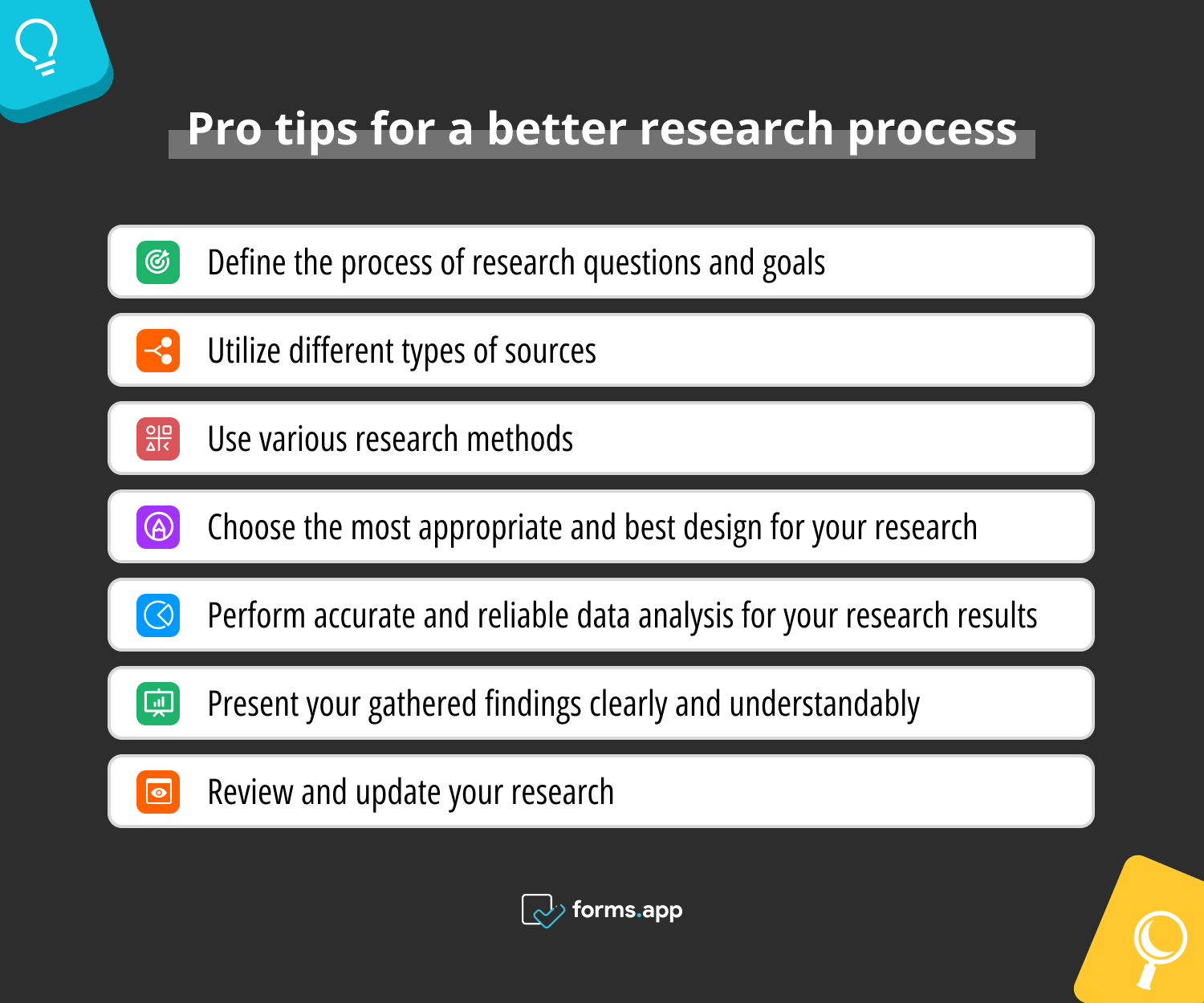
Tips to follow for a better research process
✅Defining the research question and goals is essential to fully understand what you are trying to learn and what you want to achieve. A well-defined research question guides your research strategy. It helps you narrow the scope and evaluate the results.
✅Selecting reliable sources is essential to provide reliable information related to the research question. Utilizing different types of sources allows you to evaluate the reliability and quality of your sources.
✅For effective research, it is crucial to use various research methods. You can expand the scope of the information you collect using multiple techniques and tools. You can utilize a mix of quantitative and qualitative approaches.
✅You can apply various designs for your research. Choosing the most appropriate and best design for your research helps ensure the validity and reliability of your study.
✅You need to perform accurate and reliable data analysis for your research results. After collecting reliable data, you can obtain reliable findings with a correctly performed data analysis. You can interpret your findings carefully using appropriate statistical methods.
✅You should present your gathered findings clearly and understandably. A clear and concise presentation is essential to communicate your research results effectively.
✅Review and updating your research is vital to ensure your information remains valid and up-to-date.
Final words
Creating a research project and managing this process is not easy. The effectiveness of your research process depends on whether you manage a successful process. You should take some steps to increase effectiveness and points you should pay attention to. Comprehensive but understandable research is essential to make your work successful.
You learn the best practices you can use and the steps and tips you need to follow regarding the research process. Now is the time to take action. By applying what you have learned to your research process, you can now ensure effective research process management.
Işılay is a content writer on forms.app. She is passionate about advertising. This passion comes from the fact that she likes to make things interesting for people. She loves reading and writing. Işılay specializes in marketing, survey types, and program management.



 6 minutes de lecture
6 minutes de lecture